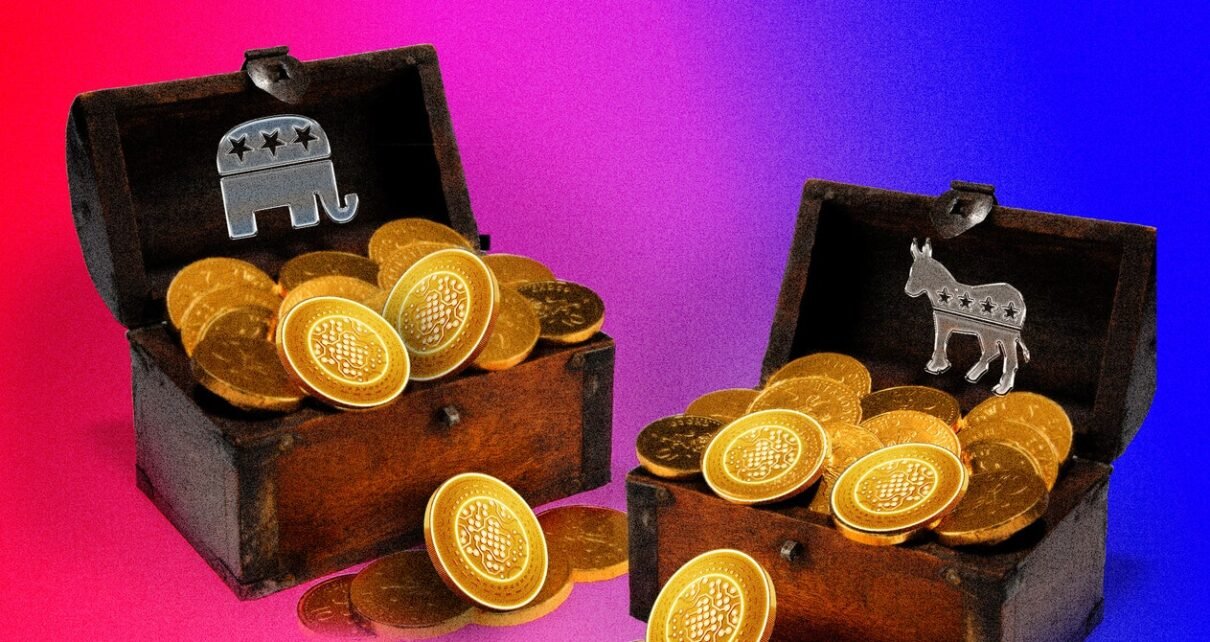Amongst the sea of American flags and ubiquitous blue signs at the Democratic National Convention in Chicago this week prowled Jonathan Padilla, the “crypto guy.”
Wearing a baseball cap and conspicuous pineapple-print shirt, Padilla tramped the halls of the convention, talking crypto policy with anyone who would listen. In a selfie posted on Facebook, he posed with his arm around Senator Chris Coons of Delaware. “Senator Coons now knows about crypto,” reads the caption.
Padilla is delighted with his new “crypto guy” moniker, assigned by fellow DNC delegates, which he sees as implicit recognition that cryptocurrency has arrived on the political agenda. “Four years ago, crypto was a nonissue and nobody talked about it,” says Padilla. “But now, you have President Trump talking about it at major conferences. And it’s being discussed by some of the highest-ranking Democrats.”
Padilla is the founder of crypto marketing company Snickerdoodle Labs and was previously resident blockchain whisperer at PayPal. He is also one of the organizers of Crypto4Harris, a coalition of Democrat-supporting members of the crypto industry, whose aim is to encourage Kamala Harris to support crypto-specific legislation and demonstrate that the sector “is not monolithically Republican,” says Padilla.
On August 14, Crypto4Harris hosted a virtual town hall attended by prominent Democrats, among them Senate majority leader Chuck Schumer, who said he “believed in the future of crypto.” The group has also “made headway,” Padilla claims, with “finance and policy folks” inside the Harris camp.
The group’s access to the Harris team reflects a sea change in the attitude toward crypto among US politicians, who seem to have accepted that there exists a bloc of voters who will cast their ballot based exclusively on which candidate will send their investments to the moon. (You know, forget immigration, health care, and the rest.) Not to mention the hefty donations crypto businesses are throwing around.
Flush after an upswing in crypto prices in 2024, crypto firms have invested an “unprecedented” amount in influencing the outcome of the US election this year, an analysis by consumer advocacy nonprofit Public Citizen suggests. Despite their comparatively diminutive size from a revenue perspective—and the continued paucity of use cases outside of financial speculation—crypto businesses account for 48 percent of all corporate contributions this election cycle.
The crypto industry put some money behind the 2020 race. But there is fresh urgency and forcefulness in its attempted intervention in the 2024 campaign. “The industry believes this election is existential,” says Veronica McGregor, chief legal officer at crypto wallet company Exodus, speaking in a personal capacity as an industry veteran. “No matter who gets into office, changes need to happen for our industry to thrive like it should.”
The majority of political donations from the crypto industry are being fed through a trio of affiliated super political action committees (PACs): Fairshake, Protect Progress, and Defend American Jobs. These organizations cannot donate directly to political candidates, but they can spend freely to promote those that make the right sort of cooing sounds about crypto.
Under the Biden administration, crypto companies have been roughed up and dragged into court by US financial regulators, which they view as deeply unfair. But through the super PACs, crypto firms are hoping to bring into power politicians who will support bespoke crypto legislation that ends the debate over how crypto should be classified and which regulator’s rules should apply.
The largest of these super PACs, Fairshake, has raised more than $200 million—a greater sum than any other super PAC, crypto-specific or otherwise. Its major donors include crypto businesses Coinbase and Ripple, pro-crypto venture capital firm a16z, and an investment firm started by Cameron and Tyler Winklevoss, founders of crypto exchange Gemini.
The largest of the Fairshake donors, Coinbase, which has contributed $45 million to the pot, is the subject of a formal complaint to the Federal Election Commission. Lodged jointly by Public Citizen and software developer Molly White, creator of Follow the Crypto, a project that traces crypto industry donations, the complaint alleges that Coinbase violated campaign finance laws by contributing to Fairshake while negotiating a deal to become a federal contractor.
Coinbase declined an interview request, pointing instead to public comments made by Paul Grewal, its chief legal officer, disputing the characterization of the company as a federal contractor on the grounds that the service it provides is not technically funded by tax revenue. “To us, it looks like Coinbase is trying to find a loophole that doesn’t really exist,” says White.




